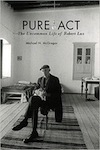 Michael
N. McGregor: Pure Act: The Uncommon
Life of Robert Lax. New York: Fordham University Press, 2015.
Michael
N. McGregor: Pure Act: The Uncommon
Life of Robert Lax. New York: Fordham University Press, 2015.
In his 1996 book Hermits:
The Insights of Solitude, author Peter France featured Robert Lax as
a proposed modern hermit Thoreau and Merton as the others)s. But Lax emerged as enigmatic.
Michael McGregor's definitive biography confirms the
enigmatic nature of Lax's peripatetic travels and visions of poetic
expression, and further distinguishes Lax's personality from intellectual and emotional origins.
A Jewish convert to Catholicism, Lax moved happily in the circle of liberal Catholic thinking of the 1930s and beyond, first at Columbia University with companion Thomas Merton -- his greatest influence -- and subsequently as a quiet presence among various Catholic publications, widening intellectual circles, and within social causes. But Merton's powerful personality defined Lax, even negatively, as the author notes early in the book:
Merton was vitally concerned ... with finding answers, while Lax seemed more comfortable with questions. ... While Merton shouted to the world what he'd discovered in the cave of solitude, Lax sat quietly within, offering an occasional smoke signal.
Lax's peregrinations and penchants, while eccentric and of enigmatic motive, never amount to the eremitism that Peter France sought to attribute to Lax. Lax alternatively fidgeted with assignments, dropping and pursuing work, and lacked stamina and purpose, pursuing a life of vagabonding versus stable relations to the people and places to which he professed affection. At times Lax proffers plums of energetic writing and dotes on teaching opportunities soon found boring and confining, his behavior suggesting "indolence and indecision," as the biographer notes. Lax was "sick of what he had to do to make a living, sick of the world he felt forced to live in, sick of America ... of what American culture, especially its business culture, did to sensitive people with talent."
As a person of talent, Lax was an experimental modern poet (verses written vertically) and very occasional essayist or "roving editor" for little Catholic magazines and New Yorker stints. His official status in these venues was nominal, as McGregor's details show. By the late fifties, Lax suffered physical ailments from poor diet and psychological ailments (depression is suggested) from "his desires, his habits, his lack of vocation."
In the end Lax went to live in Greece among islands (Kalymnos, Patmos) -- Peter France had a special interest in Greece, living in Patmos himself. There Lax idealized the fishers, sponge divers, and farmers as virtually childlike, "viewing them much as the European once viewed the New World natives," as "Pygmalion staring at his statue." Lax had already idealized circus performers, sailors, and stevedores during his vagabonding across the United States and Europe. These idylls had always been based on the tacit assumption that someone would bail him out when he ran out of money: a wealthy American expatriate, an old college chum, or his family. Ironically, his many travels to and from the Greek islands raised suspicion among authoritarian officials in the sixties and seventies that he was an American spy.
Refreshingly, seventy-plus year old Lax wrote to a friend that "I spend most of my time alone: reading, writing, walking. Think I'd like to do it for about 1000 years ... You take long walks ... write little notes or long papers. Read the most serious book you ever heard of and never got around to till now. Memorize Lao Tzu." But biographer McGregor still notes that Lax "was far from becoming a hermit." Perhaps Lax's social circle had always been too wide, his childhood and family too beloved, his solitude a grand attempt to disculpate a burdensome flaw or psychological proclivity.
McGregor notes that "The hermit mantle never settled easily on Lax's
shoulders." The book's exhaustive details confirm this conclusion.
Pure Act (the title is a
reference to Aquinas) is a great source for older Catholic enthusiasts
of Merton and company. Lax was certainly in that circle, and McGregor
is a sympathetic while realistic observer. A model for modern eremitism
is difficult to craft, but Peter France was misleading. McGregor's
honest book shows that Lax's
troubled solitude unfortunately does not provide the input for that
evanescent hermit model.
¶
